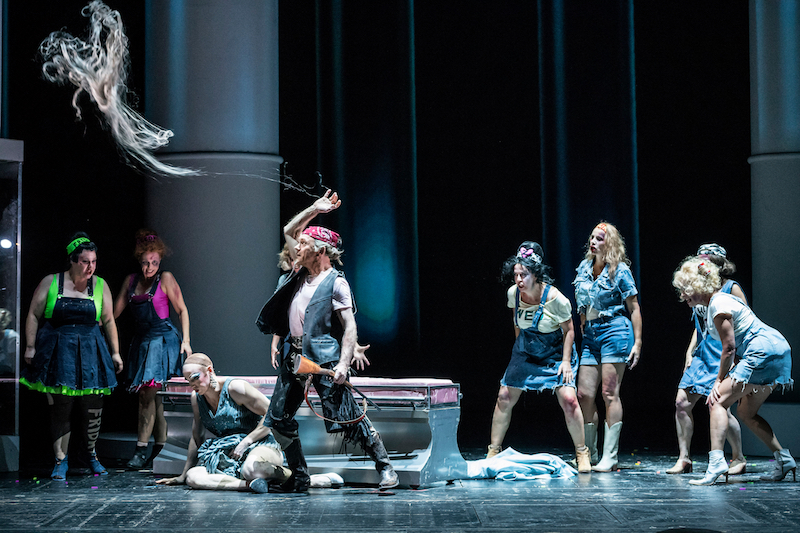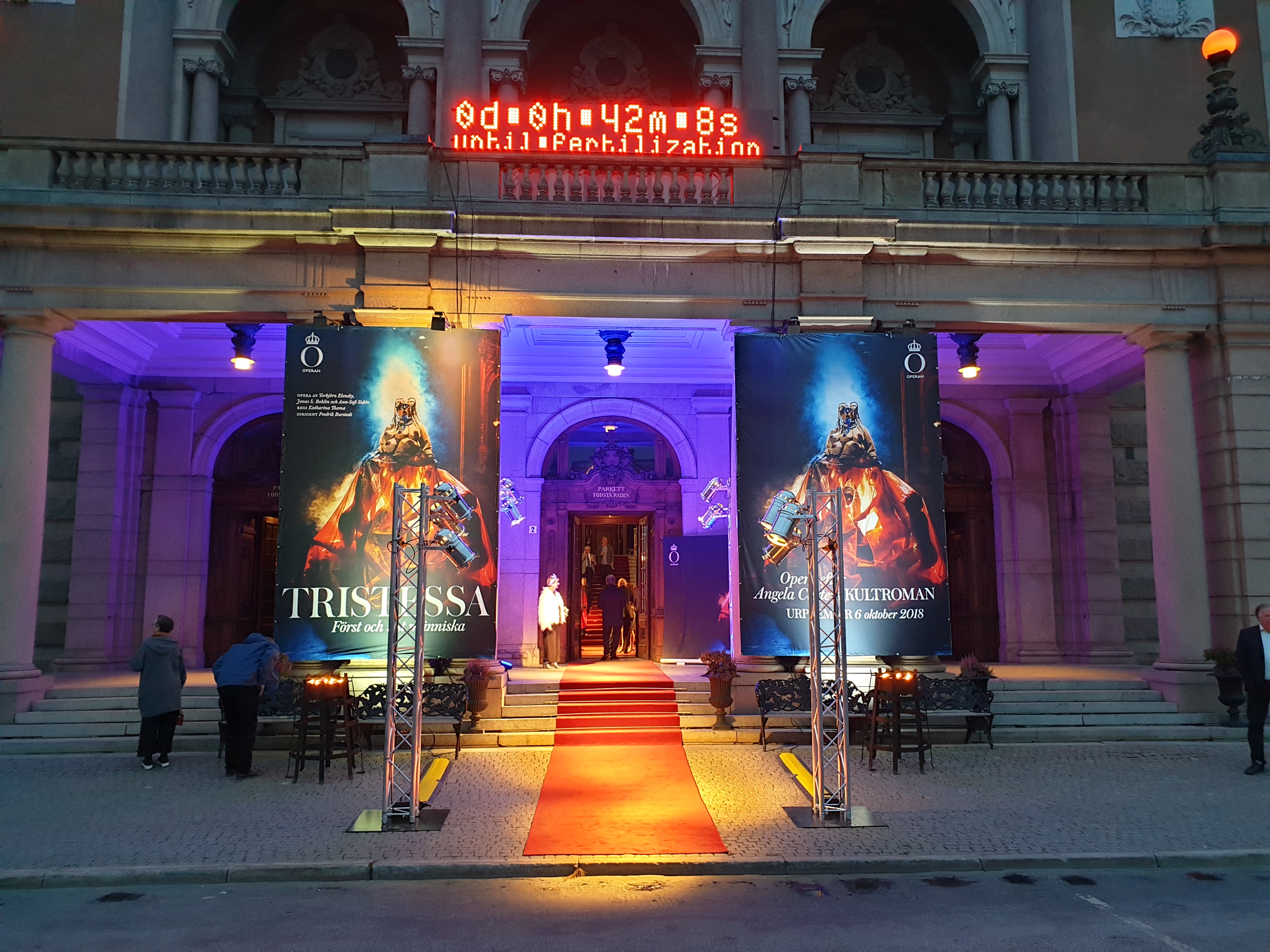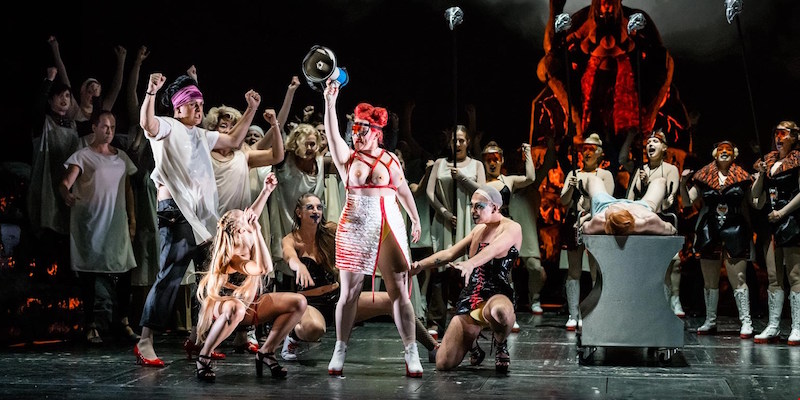The Royal Opera House, Stockholm
October 6, 2018
Any opera that features gender reassignment surgery live on stage while the chorus chants a ‘phallocentric universe’ is bound to grab one’s attention, and indeed the Royal Swedish Opera’s world premiere of Jonas S Bohlin’s new opera Tristessa was dramatically, visually and musically compelling.
 Joel Annmo as Eve and John Erik Eleby as Zero in Tristessa. Photograph © Sören Vilks
Joel Annmo as Eve and John Erik Eleby as Zero in Tristessa. Photograph © Sören Vilks
Bohlin’s opera is based on The Passion of New Eve, the ground-breaking 1977 novel of English writer Angela Carter. Set in a dystopian United States and exploring issues of gender and identity, the grand scale and sheer audacity of Carter’s literary imagination is perfectly suited to the medium of opera. In spite of the seriousness of the subject matter, Carter and Bohlin create a work that is at times humorous and satirical, but also thought-provoking and genuinely shocking. No one in the opening night audience, which ranged from traditional opera-going types to younger thrill seekers can have left unaffected by some of the visual and musical elements of the evening. Although the novel is now more than 30 years old, it is a shrewd choice of subject matter and seems remarkably relevant to the world of politically power and gender politics in 2018. Interestingly, the Swedish Opera’s commission dates from 2011, years before the advent of Donald Trump and the #MeToo movement.
I am not sure if it makes much sense to recount the plot, as I suspect that Tristessa is better experienced rather than analysed. The story centres on Evelyn, a 40-something university lecturer in English (convincingly sung and acted by tenor Joel Annmo). Evelyn has a dirty secret. As an adolescent he harboured a secret lust for a silent film star, Tristessa. This was not a conventional schoolboy crush. Evelyn got his kicks from imagining he was Tristessa, and this has led to a world of woe. In Act I, we see him flailing in his relationship with Leila (Kerstin Avemo), whom the music makes clear desires emotional connection, but Evelyn just can’t get past his obsession. The scene takes place in a 1970s New York leather bar, where every kind of sexual and gender transgression imaginable is taking place. Enter the commanding Mother, played by John Erik Eleby, a kind of timeless earth goddess, multi-breasted and sitting in a grotto. Through her nurse assistant (Susann Végh) Mother manipulates for Evelyn to undergo gender reassignment surgery, and the 45-minute first act closes with the surgery taking places behind a hospital curtain. Graphics projected onto the curtain leave us in no doubt as to the technical aspects of the procedure.
 Photograph © Robert Veel
Photograph © Robert Veel
In the second act Evelyn becomes Eve and discovers that, in spite of having resolved his gender identity issue, life as a woman is no fun at all in this male-dominated dystopian world. Eve finds herself somewhere in south-west US, humiliated sexually and psychologically by Zero (also sung by John Erik Eleby) and his chorus of seven sex slaves. In a final transformation, Eve becomes Tristessa and the setting changes to a Hollywood mansion. Tristessa is killed and laid out in a glass coffin, but not before singing her own kind of Liebestod, in a clear nod to Wagner. Yes, it’s a baffling story but no more confusing than a mid-career Verdi or Rossini storyline. In case you’re not already confused, the libretto (sung in English, with Swedish subtitles) suggests that Tristessa herself never actually existed, so perhaps everything we are seeing and hearing is taking place in Evelyn’s mind.
Jonas S Bohlin may not be a household name in English-speaking countries, but he is well established in Sweden. Over a three-decade composing career he has produced an impressive range of works, including several large scale orchestral and choral works, chamber pieces, songs and instrumental works. All of this is evident in the score of Tristessa, which contains endless variety of scale, style and detail. Bohlin’s style is generally very direct – this is intelligent, accessible and enjoyable music. I was reminded of American composer Jake Heggie’s Dead Man Walking and Great Scott, though to my mind Bohlin’s music has more subtlety and greater emotional depth than Heggie’s very successful compositions. Bohlin is not afraid of depicting the emotional life of some of the characters (such as Leilah) in a quite conventional, almost romantic way, while at other times he uses large scale orchestration, rhythmic and tonal instability to paint a superb musical picture of the chaotic world in which Evelyn lives. Often there is an underlying rhythmic pulse to the music, reminiscent of Philip Glass, which gives dramatic tension to the storytelling. And finally, there are clear nods to the operatic tradition in Bohlin’s writing, such as the aforementioned Wagnerian ending.
 The company of Tristessa. Photograph © Sören Vilks
The company of Tristessa. Photograph © Sören Vilks
One of the most exciting aspects of a world premiere is to see the singers and chorus creating characters from scratch, with no precedents on which to base their interpretations. On the whole, the home-grown cast did a fine job, using Bohlin’s expressive music and tight stage direction by Katharina Thoma to create memorable and convincing portrayals. Only the Zero/Eva scene at the beginning of the second act fell a bit flat, perhaps because of indifferent music or perhaps because of the somewhat tentative performances by Zero’s seven women.
One expects excellent orchestral standards in Scandinavia, and indeed the Swedish Royal Court Orchestra under Fredrik Burstedt was most impressive. After its inevitably short run in Stockholm, let’s hope that Tristessa is taken up by festivals and major houses in upcoming years. It’s work that certainly deserves to be heard more and is accessible enough to appeal to a wide ranging audience, not just opera or new-music lovers.











Comments
Log in to join the conversation.